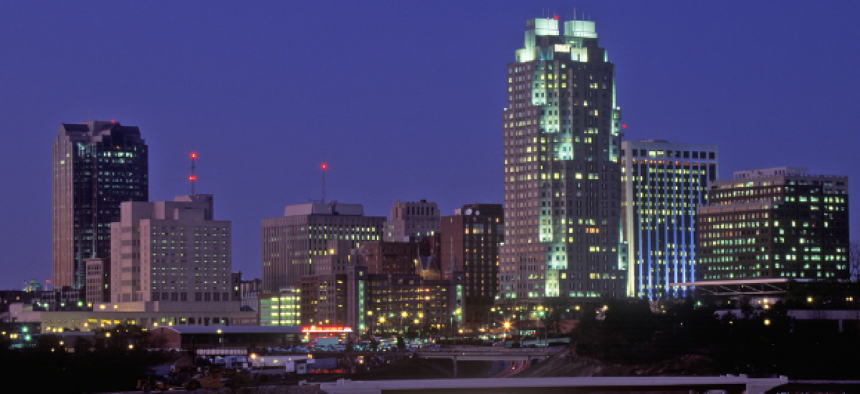City of Raleigh takes open technology to the limit


Connecting state and local government leaders
Raleigh, N.C.’s Open Raleigh initiative is pursuing open data and open access projects in an effort to drive public interest and industry investment.
Open data, open access and open source.
That’s the scope of the Open Raleigh initiative, currently under way in the City of Raleigh, N.C. The concerted effort aims to improve citizens’ ability to tap government data, sharpen city officials’ decision-making, promote open-source technology and increase high-speed Internet access.
The city council’s 2012 open government resolution provided the impetus for Open Raleigh, which is slated to expand this year. Gail Roper, Raleigh’s chief information officer, said the plan is consistent with the city’s overall push for greater transparency.
The effort got another lift recently through its collaboration with Code for America, a San Francisco-based nonprofit organization that places developers with local governments through its fellowship program. “The start of our Code for America initiative here helped us to be a little bit more strategic in terms of our effort to move forward,” Roper said.
Three-pronged approach
The city currently pursues three primary programs under the Open Raleigh banner: an Open Data Portal, an effort to expand Internet access and a regional broadband network initiative.
The Open Data Portal lets citizen search and browse data sets and visualizations covering such areas as budget, building permits and fire incidents. Perhaps more important, city employees can access and analyze the data as well. Roper said that’s a shift from previous years when staffers had to rely on an IT department representative to make that data available. The Open Data Portal provides more of a self-service model. “The staff can begin to solve their own problems, in terms of questions and issues around certain areas,” Roper said.
The city plans to expand the Open Data Portal, asking citizens about what datasets they would like to see added. Raleigh is also working with other local governments to make the portal a shared resource. “We are clearly working toward a multijurisdictional model where it is not just Raleigh doing a separate effort,” Roper said.
Another Open Raleigh program seeks to expand Internet access in underserved areas. Together with that effort, Raleigh offers its Digital Connectors training program, which provides technology training to youth in areas including digital literacy, hardware, networks and programming. The participants, in turn, go back into the community and train their family, friends and the elderly, Roper said.
The city and its partners, meanwhile, are reviewing proposals on a third program, the North Carolina Next Generation Network, or NCNGN, a regional project to develop high-speed broadband services. The project seeks to “create a gigabit, fiber network to foster innovation, drive job creation, stimulate economic growth and serve new areas of development in the community,” according to the NCNGN request for proposals.
Raleigh is pursuing the broadband project together with five other cities and four research universities. Contractor selection is expected this year.
Open-source priorities
Raleigh has also made open-source technology a priority under the Open Raleigh plan. That direction was envisioned in the city council’s initial resolution, which directed the city’s IT department to set an open systems procurement policy. The policy promotes RFP specifications that, “encourage technology solutions with an open-source licensing model, which stores and exposes public data using industry-standard and open protocols.”
Roper said the city has now incorporated open-source technology into its infrastructure. The city’s Web portal is built around open-source tools, she said, and when the IT department looks at product purchases it considers open-source options as part of the process.
“It is becoming part of our culture,” she said.
The city also plans to make data analysis part of its culture. Roper said Raleigh this year plans to bring in more analytical skills, “to make sure we get value out of the data that is available.” The city will looking to acquire those skills through new hires and fellowships, as well as bringing in university students to assist with the analytical aspects of data mining, according to Roper.
Economic development
Open Raleigh’s data access philosophy also has an economic dimension. Roper said she believes the ability to improve data and information access, “could help us make prudent business decisions.”
Open access has a broader economic development role for Raleigh. The city offers Wi-Fi access in its downtown core and has upgraded the telecom infrastructure in the city’s convention center. As a result, the city has started to become an East Coast hub for bi-coastal events and conferences. Wider Internet access is also a boon for small businesses by enabling them to conduct credit card transactions when they sell goods during festivals.
Open Internet access, Roper said, “becomes part of the core and fabric of the city of Raleigh. When you come, you know you are going to be able to do whatever you are here to do.”

NEXT STORY: 'Build once, use often' guides Medicare.gov improvements




